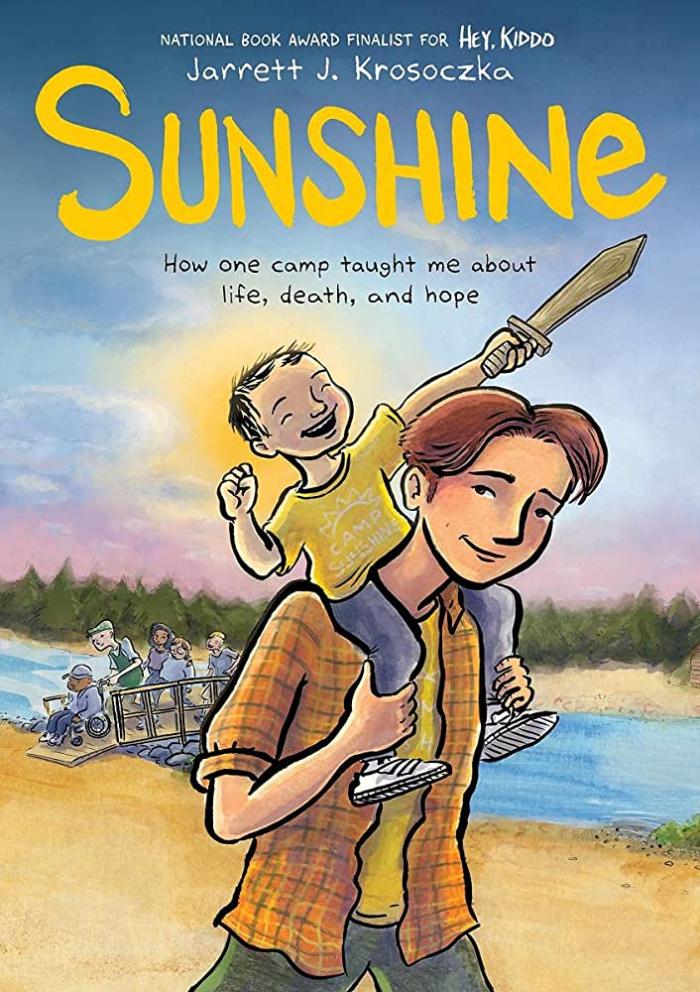You are here
Home › Comics › Jarrett J. Krosoczka's Graphic Novel Memoir 'Sunshine' Is Life-Affirming Tale Of Hope Amid Adversity ›Jarrett J. Krosoczka's Graphic Novel Memoir 'Sunshine' Is Life-Affirming Tale Of Hope Amid Adversity
FTC Statement: Reviewers are frequently provided by the publisher/production company with a copy of the material being reviewed.The opinions published are solely those of the respective reviewers and may not reflect the opinions of CriticalBlast.com or its management.
As an Amazon Associate, we earn from qualifying purchases. (This is a legal requirement, as apparently some sites advertise for Amazon for free. Yes, that's sarcasm.)

An estimated 400,000 children worldwide under the age of nineteen develop cancer every year. Unlike adult cancers, which are most often ascribed to high-risk lifestyle or environmental factors (smoking, obesity, exposure to hazardous materials, etc.), genetic predisposition and mutations are the common causative culprits for children afflicted with the disease. For a family facing the unexpected tribulation of caring for a child stricken with cancer, the emotional, social and financial fallout can be devastating. The consistent strain of repeated hospitalizations, difficult treatments and the disruption of ordinary daily routines affects each familial member, and finding even the smallest glimmer of hope in such a bleak situation can be key for patients, parents and siblings alike.
Due for release by Scholastic’s Graphix imprint April 18, Jarrett J. Krosoczka’s heart-wrenching new coming-of-age autobiographical graphic novel, Sunshine, explores that hope and how its presence can inspire the best in humanity during dark times. The follow-up to his National Book Award nominated debut, Hey, Kiddo,
Krosoczka’s latest is a recollection of his time as a counselor at the titular Camp Sunshine, a retreat for children battling pediatric cancer and their families. Set in 1994, sixteen-year-old aspiring cartoonist Jarrett is one of a group of volunteer students from Holy Name High School chosen to work for a week at the camp. Childhood adversity of his own has made Jarrett eager to help others, but he embarks on the endeavor without fully knowing what awaits him. Arriving at Camp Sunshine with a motley crew of schoolmates—lunkhead jock Chad, overachiever Andrea, charismatic clown Jonny, Jarrett’s class tormentor Evelyn and his quasi-crush Christine—each are assigned to look over a different patient age group and family. Jarrett’s primary task is establishing a one-on-one peer friendship with Diego, an isolated and depressed wheelchair-bound brain cancer patient only a few years younger than himself, but his designated family brings him into contact with plucky Power Ranger-obsessed acute lymphoblastic leukemia sufferer Eric. Inspired by Eric’s courage in the face of overwhelming odds, Jarrett finds the personal strength to help Diego overcome the despondency that has consumed him.
As a visual memoir, there’s much going for Sunshine. Krosoczka’s artistic style lies firmly in the same deceptively minimalist indie vein as Craig Thompson of Blankets fame, with primitive figures and line work that nonetheless induces deep emotional resonance buttressed by a moody palate of muted colors. There’s a poignancy to the story that allows it to transcend the sometimes humdrum naval-gazing nature of autobiographical comics; Jarrett’s own challenges as a youth—a drug-addicted mother and absentee dad—give him a link to both the kids at Camp Sunshine and his fellow counselors, all of whom are revealed to have endured tough-luck family affairs. That empathy serves as the beating heart of the storyline; Jarrett learns the true power in serving others, and his interactions have a profound impact on his worldview and the course of his subsequent life. Yet however fatalistic or downbeat the tale may initially appear, Sunshine succeeds in becoming a life-affirming journey. Despite thematic undercurrents of sadness, loss, death and grief, there’s both a copious amount of raucous humor (every counselor dreads donning the camp mascot outfit due to its nausea-inducing flatulence stench) and an uplifting message woven throughout its narrative fabric, which is, simply, this: appreciate who you have while you have them, because one day you won’t. A paradoxical sentiment, perhaps, but no less true.
Filled with tenderness, heartache and ever-earnest prose, Krosocska’s experience at Camp Sunshine serves as a much-needed reminder that the most important things in life are not things at all, but those closest to our hearts, and it’s for that reason that I bestow Sunshine a respectable 4 (out of 5) on my Fang Scale.


